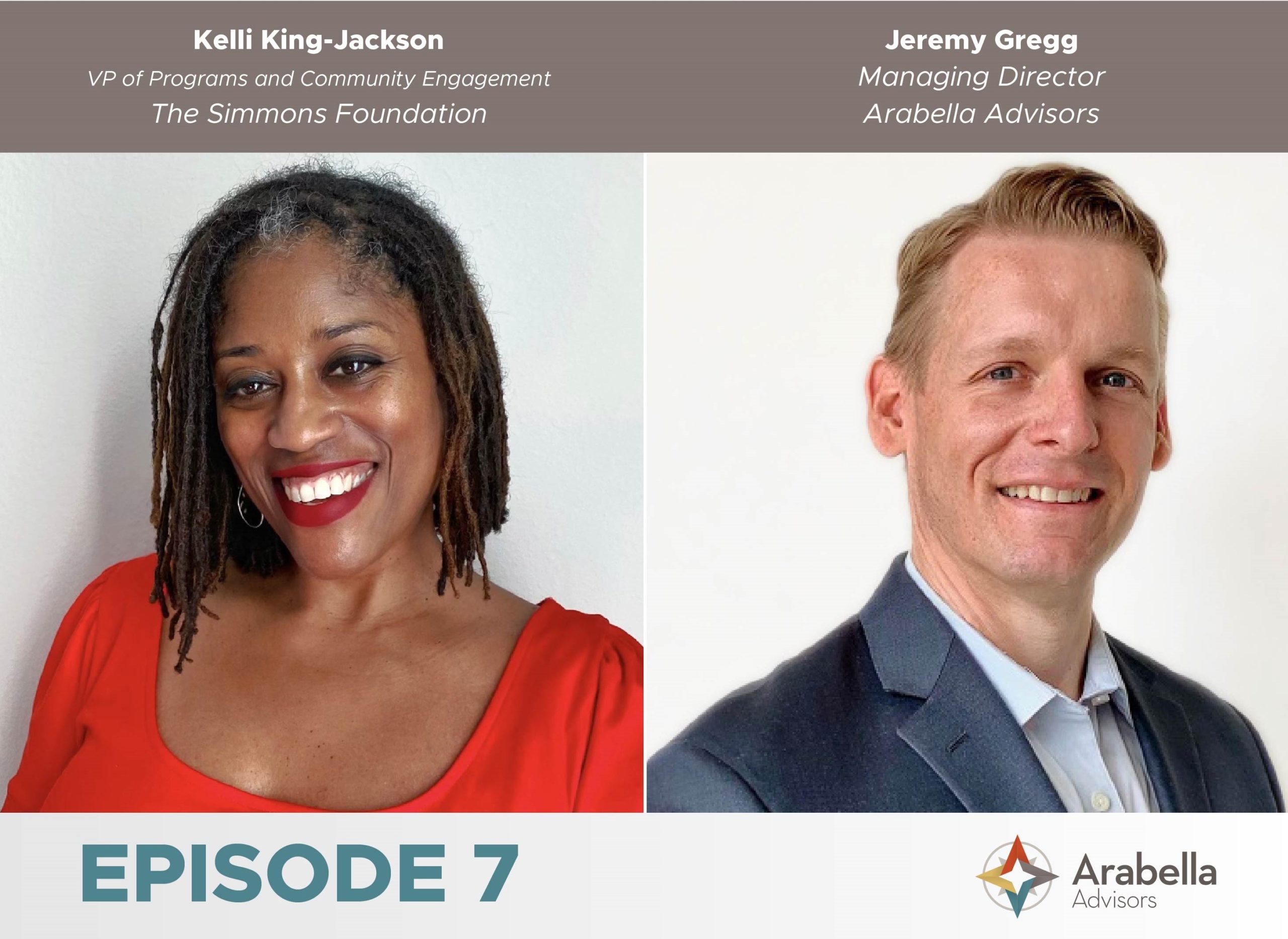Kelli King-Jackson and the Simmons Foundation

In the seventh episode of Arabella Advisors’ podcast series, Arabella Managing Director, Jeremy Gregg, spoke to Kelli King-Jackson, Vice President of Programs and Community Engagement at The Simmons Foundation. Kelli shared about her life, her teachers, and her belief that we accomplish the most together and through education. She also expanded on her belief that philanthropy is more than just “writing a check”; it’s an investment in community. Here are some soundbites from their conversation:
- “I was born and raised in Oakland to a mother who is extremely passionate about education. She always had us in programs, summer school, suburban public schools with good science programs. She felt that, as a Black woman from the South, she wanted me and my brother to have different opportunities. That led me to prep school in Northwestern Massachusetts. In retrospect, I was able to do that because my mom had me in environments where I was frequently the only Black person there; and so I was able to have a very good sense of self, in white spaces, from a very early age.”
- “Many people have questioned why I left Oakland at 15 and went to a boarding school. My mom had always instilled in me that the world was open to me and that we should not be afraid to try, to be in new spaces and trying new things.”
- “My first social justice action that I can remember is on that prep school campus. We did a silent protest during chapel because of an incident that had happened between a student of color and a white student. We were trying to make the case that the n-word was an act of violence. […] The most significant outcome of that was we got to meet with the head of school about what our experiences were as students of color on campus. And they started to make some changes that were helpful, including a campus wide day of reading and reflection that started around MLK day. To my knowledge, they still do that to this day.”
- “I learned that I had a voice. I learned that early on in my prep school classes, in sophomore English. My teacher, a white man, wanted to hear what my opinion was. I would just regurgitate facts, because that is how I had been educated; you read the book and say what was in the book. He kept telling me ‘I don’t want to hear what was in the book, I want to hear what you think’. And I did not know what he was asking of me. He helped me formulate my voice and find it in my writing. […] That took me to a deeper level in how I use my words to communicate feeling and the challenges I was seeing in my community.”
- “Because I couldn’t afford NYU tuition, I had some Black women I was doing work study for who knew my mom was struggling financially. They let me know that I could get tuition reimbursement if I worked there full time. They coached me through the interview prep and what I should wear. So at 19/20 I interviewed for a job at NYU, got the job, and was able to continue my education because these Black women had taken me under their wing and helped me feel confident enough to get a salaried job.”
- “I don’t believe I do anything alone. None of what I have accomplished is because I am exceptional. I have adult children, and I talk to my children about not buying into this myth of exceptionalism and that we somehow got where we are only through working hard. Yes I absolutely work hard AND I have had a lot of support; My support has been teachers, mentors, and amazing humans who love me and cheer me on and call me in when they see me struggling. That is why I am able to do my work the way I do it. I don’t see philanthropy as a transaction, a check going to an organization; I see it as my job to build a relationship and understand what is happening in the community and then help my board to understand why this is an investment they should be making into our ecosystem of groups that are trying to bring justice into Houston.”
- “It takes a lot of humility [to work in this field]. I work in a very white industry that got its wealth through harmful means. I can’t come into partnerships with folks and act like we are not part of the problems the communities are facing. I have to have humility and name the thing. I say partner but can I be seen as a partner when I hold the power in the relationship. We need to be really honest about how difficult it is to build a relationship with a funder. […] but that doesn’t mean we shouldn’t try to be better with our grantmaking. And so that is what we do. We admit we don’t have it all figured out or the answers.”
To hear more about Kelli’s hopes for the future of philanthropy, and how she is working towards them, listen to her full conversation with Jeremy here.
